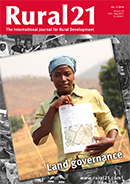Vol. 50 Nr. 3/2016: Land Governance

Land is a major source of people’s identities and livelihoods as well as being a key asset for households. Land ownership and land use rights crucially affect both equality of opportunity and economic and environmental stability. It is entirely justified to include these rights in the Sustainable Development Goals and not without reason that the adoption of the Voluntary Guidelines on the Responsible Governance of Tenure (VGGT) attracted so much attention four years ago. Often, land remains the only source of livelihood for poor and marginalised households. Thus improved security of land rights first of all creates secure access to basic necessities such as housing and nutrition. When such needs are met, the poor are more likely to be able to afford education, which helps people exit the vicious cycle of poverty.
Focus
- Improving land governance – for the sake of the rural poor
- Why property rights matter
- Land governance in German development cooperation
- Land reform – the solution to rural poverty?
- What about the land rights of communities and Indigenous Peoples?
- Tanzania’s Village Land Act 15 years on
- Cambodia: Land grabs and rural dispossession by government design
- No food security without land tenure security?
- Those in darkness drop from sight
- Net impacts of large-scale land acquisitions



